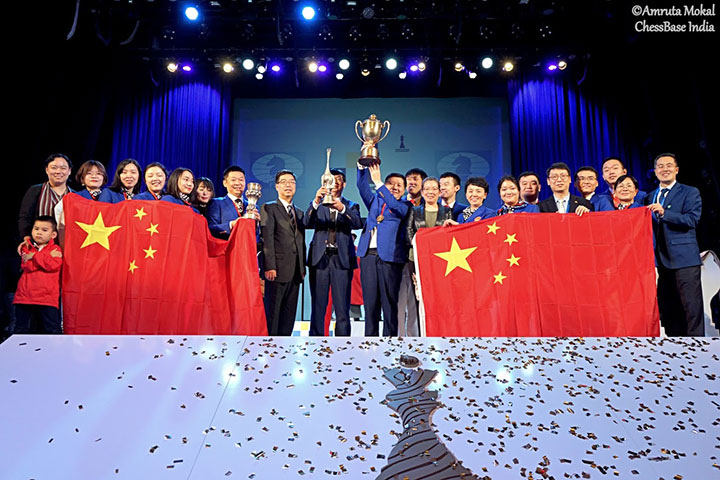


ChessBase 17 - Mega package - Edition 2024
It is the program of choice for anyone who loves the game and wants to know more about it. Start your personal success story with ChessBase and enjoy the game even more.
It often happens at an event like the Olympiad that one team moves ahead of the rest and is assured of the gold medal even before the last round has been played. Or sometimes a team has to beat a relatively weaker opposition in order to get the gold medal. Nothing of that sort was going to happen at the Batumi Olympiad 2018, as the best teams took on each other in the final round of both Open and Women's section.
| Rk. | Team | Team | Games | + | = | - | TB1 |
| 1 | United States of America | USA | 10 | 8 | 1 | 1 | 17 |
| 2 | China | CHN | 10 | 8 | 1 | 1 | 17 |
| 3 | Poland | POL | 10 | 7 | 2 | 1 | 16 |
| 4 | France | FRA | 10 | 7 | 2 | 1 | 16 |
| 5 | Russia | RUS | 10 | 7 | 2 | 1 | 16 |
| 6 | India | IND | 10 | 7 | 1 | 2 | 15 |
| 7 | Armenia | ARM | 10 | 7 | 1 | 2 | 15 |
| 8 | Ukraine | UKR | 10 | 7 | 1 | 2 | 15 |
| 9 | Germany | GER | 10 | 5 | 5 | 0 | 15 |
| 10 | Czech Republic | CZE | 10 | 7 | 1 | 2 | 15 |
USA had a slight edge in terms of tiebreak (Sonneborn-Berger) but it hardly meant anything because the fluctuations are pretty large when it comes to SB.
These were the three key matches in the open section in the final round:
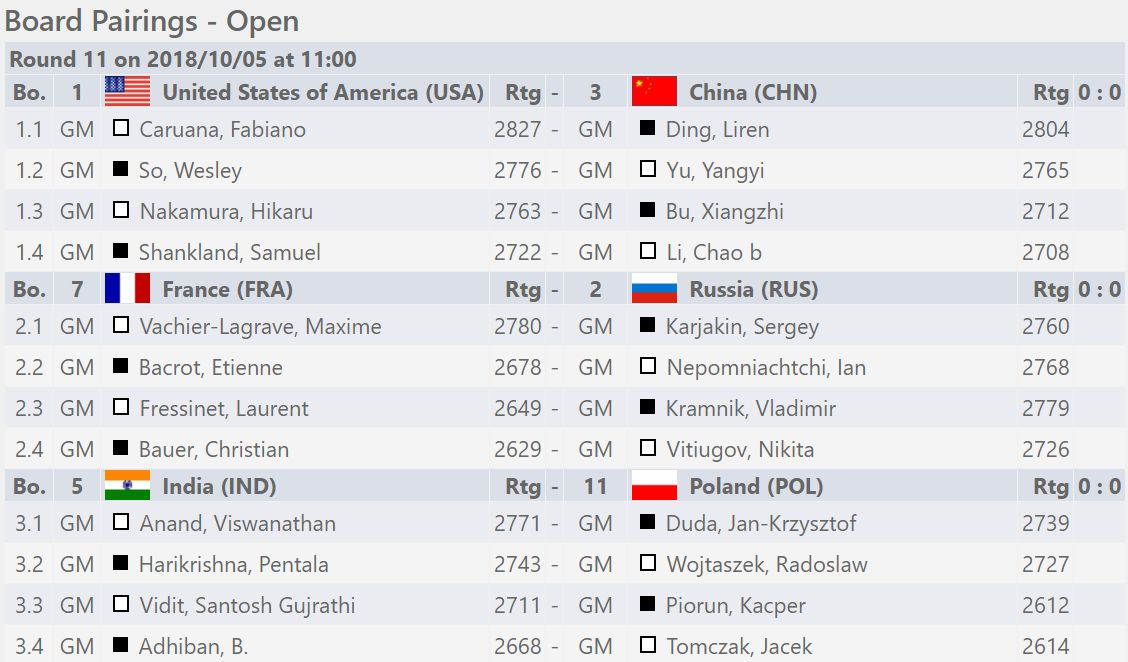
The match between the USA and China would decide who would win the gold medal. Would it be the USA two times in a row or would it be the 2014 winners China? Board two would decide another medal and if Poland won their match it would ensure them a medal finish for their fantastic performance at the Olympiad. Of course, there were other teams on 15/20 who were in with a chance for a medal if everything went in their favour not only in their own match but also in others.
Initial moments of the final round captured by ChessBase India
The final day witnessed a lot of spectators | Photo: Amruta Mokal
One of the spectators who added "glamour" with his presence was GM Timur Gareyev | Photo: Amruta Mokal
The first DVD with videos from Anand's chess career reflects the very beginning of that career and goes as far as 1999. It starts with his memories of how he first learned chess and shows his first great games (including those from the 1984 WCh for juniors). The high point of his early developmental phase was the winning of the 1987 WCh for juniors. After that, things continue in quick succession: the first victories over Kasparov, WCh candidate in both the FIDE and PCA cycles and the high point of the WCh match against Kasparov in 1995.
Running time: 3:48 hours
Poland has had a fantastic tournament. They played so amazingly that out of the eleven rounds they fought against the top eight seeds! They beat the USA and Russia! But the Olympiad is not a place where you can bank on the results of the past rounds. The Polish team had to overcome a final barrier in order to have a medal around their necks at the closing ceremony. And that final barrier was India!
Team India has their own secret jokes before the game! | Photo: Amruta Mokal
Vishy Anand agreed to a quick draw against GM Jan-Krzysztof Duda in the Petroff and Radsolaw Wojtaszek couldn't pose too many problems to Harikrishna Pentala. Everything hinged on the last two games.
Kacper Piorun began to get some nagging edge against Vidit Gujrathi, while Adhiban was taking all the possible risks that he could against Jacek Tomczak | Photo: Amruta Mokal
Once Vidit realized that the game was not going his way, he went into damage control mode and made a draw. Adhiban tried really hard to get the full point for team India. He even sacrificed a piece to try to win that endgame. But Tomczak stood strong and managed to hold the game to a draw.
For Poland, Jacek Tomczak was the find of the event! | Photo: Amruta Mokal
The match ended in a 2-2 draw. It was a disappointment for India as they finished sixth, but more so for Poland who played an amazing event and yet were pushed out from the medal tally. With 17/22 they had to settle for fourth place.
The final round being in the morning at 11:00 am is never so easy especially in such a tough tournament | Photo: Amruta Mokal
Nepo was either too sleepy, or the game was just too easy for him! He managed to play a miniature and provide that crucial win which helped his team beat France | Photo: Amruta Mokal
Williams main teaching method behind this set of two DVDs is to teach you some simple yet effective set ups, without the need to rely on memorising numerous complicated variations.
In the end, Russia beat France with a score of 2½-1½.
The Russians were roaming around pretty confidently and it's not very often one finds all the teammates being away from the board | Photo: Amruta Mokal
Kramnik fought hard but could not beat Fressinet | Photo: Amruta Mokal
The biggest match in the playing hall was between USA — the 2016 winners — and China, the 2014 winners of the Olympiad. One could say China has two super GMs — Ding Liren and Yu Yangyi against USA's three Fabiano Caruana, Wesley So and Hikaru Nakamura. But Bu Xiangzhi and Li Chao have the experience of playing at the highest level and could not be underestimated. The same could be said about Sam Shankland who played on board four for Team USA. It was a very evenly matched encounter and everyone looked forward to it with great interest.
There are only four players above 2800 currently in the world and two of them were battling against each other in the final round of the Olympiad 2018 | Photo: Amruta Mokal
Ding Liren played some inspired chess and sacrificed his rook to force a perpetual. It was a good result for China as their board one managed to draw the game with black pieces.
"Occupy the centre!" Let GM Bologan show you move by move why 1...e5 against English (1.c4) is a rock solid and excellent choice.
Wesley So speaks about his draw against Yu Yangyi on board two
Samuel Shankland also drew his game with ease against Li Chao. All eyes were on the game between Hikaru Nakamura and Bu Xiangzhi on board three. Nakamura had been playing pretty poorly at the Olympiad. It was the perfect occasion to redeem himself. But Bu Xiangzhi is a tough nut to crack. He had been having an excellent event in Batumi and our readers will remember that exactly a year ago, he had knocked out Magnus Carlsen from the World Cup 2017 that was held in Tbilisi, Georgia. Against USA, Bu Xiangzhi played really well and when Hikaru offered a draw, the Chinese player was a pawn up, although he had a pretty cramped position.
Bu Xiangzhi thought for a while, asked his captain about the decision and finally agreed to split the point. Thus the match had ended in a 2-2 draw.
The Chinese stood rock solid and held the wall high | Photo: Amruta Mokal
The next couple of hours were spent by the teams waiting for the tiebreak results. The system used was Sonneborn-Berger. This means that the points you have scored against your opponents in a match are multiplied by the final match points of the opposing team. So, for example, if the USA played against Panama in the first round and won with a score of 4-0 and Panama ended the tournament with 11 match points, then the Sonneborn-Berger of the USA would be enhanced by 44 points (4x11). The tiebreak used at the Olympiad was SB minus the lowest finishing opponent. As it turned out the tiebreaks were decided somewhere around the boards 20-30 with teams like Georgia 3 or Panama winning or losing their matches. Finally, when all the games ended we got to know that China had become the Olympiad champions for the second time!
Interview with the Chinese players after the won the Olympiad 2018
The English team finished fifth. They beat Kazakhstan in the last round. It can be said that they were helped by a slightly easier pairing, but still to finish fifth is a commendable result. | Photo: Niklesh Jain
Germany fought hard in this tournament and earned the unique distinction of not losing a single match! They finished 13th | Photo: Amruta Mokal
Alina l'Ami works really hard taking pictures at the venue, but somewhere on her mind is always the question — 'What's happening in Erwin's game!" | Photo: Amruta Mokal

The key results of the top four matches in the final round — note that there was only one decisive game out of 16 encounters
| Rk. | Team | Team | Games | + | = | - | TB1 |
| 1 | China | CHN | 11 | 8 | 2 | 1 | 18 |
| 2 | United States of America | USA | 11 | 8 | 2 | 1 | 18 |
| 3 | Russia | RUS | 11 | 8 | 2 | 1 | 18 |
| 4 | Poland | POL | 11 | 7 | 3 | 1 | 17 |
| 5 | England | ENG | 11 | 8 | 1 | 2 | 17 |
| 6 | India | IND | 11 | 7 | 2 | 2 | 16 |
| 7 | Vietnam | VIE | 11 | 6 | 4 | 1 | 16 |
| 8 | Armenia | ARM | 11 | 7 | 2 | 2 | 16 |
| 9 | France | FRA | 11 | 7 | 2 | 2 | 16 |
| 10 | Ukraine | UKR | 11 | 7 | 2 | 2 | 16 |
| 11 | Sweden | SWE | 11 | 8 | 0 | 3 | 16 |
| 12 | Czech Republic | CZE | 11 | 7 | 2 | 2 | 16 |
| 13 | Germany | GER | 11 | 5 | 6 | 0 | 16 |
| 14 | Austria | AUT | 11 | 8 | 0 | 3 | 16 |
| 15 | Azerbaijan | AZE | 11 | 7 | 1 | 3 | 15 |
| 16 | Uzbekistan | UZB | 11 | 6 | 3 | 2 | 15 |
| 17 | Iran | IRI | 11 | 7 | 1 | 3 | 15 |
| 18 | Hungary | HUN | 11 | 7 | 1 | 3 | 15 |
| 19 | Egypt | EGY | 11 | 6 | 3 | 2 | 15 |
| 20 | Greece | GRE | 11 | 7 | 1 | 3 | 15 |
Standings going into the final round:
| Rk. | Team | Team | Games | + | = | - | TB1 |
| 1 | China | CHN | 10 | 7 | 3 | 0 | 17 |
| 2 | Ukraine | UKR | 10 | 6 | 4 | 0 | 16 |
| 3 | United States of America | USA | 10 | 7 | 2 | 1 | 16 |
| 4 | Armenia | ARM | 10 | 7 | 2 | 1 | 16 |
| 5 | Russia | RUS | 10 | 7 | 1 | 2 | 15 |
| 6 | Georgia 1 | GEO1 | 10 | 6 | 3 | 1 | 15 |
| 7 | Azerbaijan | AZE | 10 | 6 | 3 | 1 | 15 |
| 8 | Hungary | HUN | 10 | 6 | 2 | 2 | 14 |
| 9 | Spain | ESP | 10 | 6 | 2 | 2 | 14 |
| 10 | India | IND | 10 | 5 | 4 | 1 | 14 |
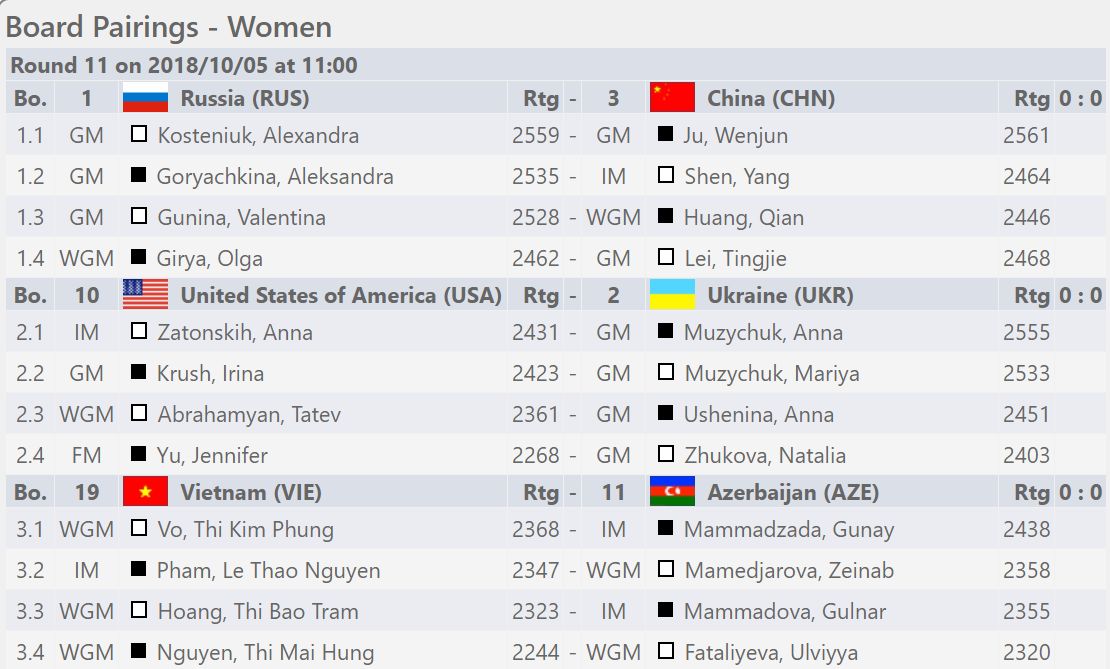
The most important pairings of final round
The most critical match of the entire event was Russia against China.
Aleksandra Goryachkina quickly built up a winning position against Shen Yang. She played some amazing sacrificial chess and crowned her strategy with a mating attack.
The Semi-Slav: A GM guide for the tournament player
The Semi-Slav (1.d4 d5 2.c4 c6 3.Nf3 Nf6 4.Nc3 e6) can arise via various move orders, has decided World Championships, and is one of Black's most fascinating replies to 1 d4. Magnus Carlsen's second, Grandmaster Peter Heine Nielsen explains in detail what this opening is all about.
This game also received the best game prize in the women's section of the entire event!
The match-up between Valentina Gunina and Huang Qian ended in a draw. It must be mentioned that Huang Qian played 11 games for China and in nine of them, she was Black! What a great sacrifice to ensure that her team does well. Russia already led with a score of 1½-½. And it seemed that the margin would be much bigger. Olga Girya was just cruising towards victory on the fourth board against Lie Tingjie. She was three pawns up and it was clear that she would win her game. At the same time, Alexandra Kosteniuk was holding her own against Ju Wenjun. 3-1 victory for Russia was on cards.
Meanwhile, Ukraine had played well against USA team and had won the match with a score of 3-1. Thus Ukraine moved to a score of 18/22. If Russia managed to beat China, then Russia and China would have been tied with 17/22 and Ukraine would win the gold without any tiebreak scenarios coming into the picture.
But destiny had something else in store! First Lie Tingjie managed to generate some counterplay in the position and created enough chances to draw the game.
Lei Tingjie miraculously saved her position! As she said in her interview later, "I was worse in the 10th round also. I think winning this Olympiad was written in our destiny!"
Lei Tingjie's draw motivated Ju Wenjun to try her best. The score was 2-1 now and if she won the game a 2-2 tie would mean Ukraine and China would be at the top with 18/22. The game was equal throughout. It seemed impossible that Kosteniuk would lose that game. But Ju Wenjun didn't give up. She kept moving around and at some point she won a pawn. The position was still even, but in that stressful environment where you have spectators, coaches, arbiters, media around you, the chances of making a mistake are very high. Somewhere around move 83 when the position was still equal Kosteniuk claimed a three-fold repetition. The arbiters decided to make the moves on the board to check the authenticity of the claim. It took nearly half an hour to do that (check the video below to see how this transpired). At some point, Kosteniuk understood that her claim was wrong and was not happy with what was going around. This half an hour break surely took a toll on her.
The arbiters wanted to be 100% sure about the threefold repetition claim as the gold medal was at stake and this took a lot of time
What a dramatic final game! Here Kosteniuk is checking with the main arbiter Takis Nikolopoulos his threefold repetition claim. Takis says clearly "it was two, only two".
— Batumi Chess Olympiad 2018 (@BatumiChess2018) October 5, 2018
photo: @davidllada pic.twitter.com/BzOUT6aPs0
The game resumed but Alexandra was not herself. She blundered immediately and lost the game. It was a humongous effort by Ju Wenjun who showed why she is the current World Champion. She could have taken a draw and no one would have told her anything as the position was drawish for so many moves. But she fought on. She persevered. For her team, for her country and they were rewarded with the gold medal. China tied for first place with Ukraine, but the tiebreak favoured the Chinese women. Spare a thought for the Russian women who fought so hard but had to be content with the fourth place.
A dramatic finale between Alexandra Kosteniuk and Ju Wenjun captured by ChessBase India
Coach of the Chinese team congratulates Ju Wenjun on her amazing tenacity and fighting spirit | Photo: Amruta Mokal
Chess is a gentleman's game. Yes, it was a hard match for Russia but Rublevsky ensured that he shook hands with coach Yu Shaoteng | Photo: Amruta Mokal
Ju Wenjun, the reigning World Champion, had done it! With a rating performance of 2661, she had helped China win the gold medal. Minutes after the game she was surrounded by media from all over the world. | Photo: Amruta Mokal
Interview with Ju Wenjun and Lie Tingjie after they won the gold medal
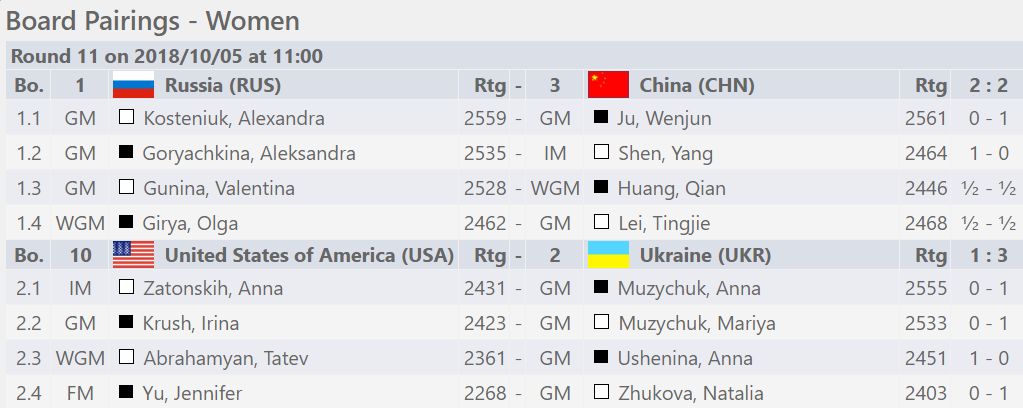
The two matches which decided the medalists for the women's section of the Olympiad 2018
| Rk. | Team | Team | Games | + | = | - | TB1 |
| 1 | China | CHN | 11 | 7 | 4 | 0 | 18 |
| 2 | Ukraine | UKR | 11 | 7 | 4 | 0 | 18 |
| 3 | Georgia 1 | GEO1 | 11 | 7 | 3 | 1 | 17 |
| 4 | Russia | RUS | 11 | 7 | 2 | 2 | 16 |
| 5 | Hungary | HUN | 11 | 7 | 2 | 2 | 16 |
| 6 | Armenia | ARM | 11 | 7 | 2 | 2 | 16 |
| 7 | United States of America | USA | 11 | 7 | 2 | 2 | 16 |
| 8 | India | IND | 11 | 6 | 4 | 1 | 16 |
| 9 | Georgia 2 | GEO2 | 11 | 7 | 2 | 2 | 16 |
| 10 | Azerbaijan | AZE | 11 | 6 | 4 | 1 | 16 |
| 11 | Kazakhstan | KAZ | 11 | 6 | 4 | 1 | 16 |
| 12 | France | FRA | 11 | 7 | 2 | 2 | 16 |
| 13 | Spain | ESP | 11 | 6 | 3 | 2 | 15 |
| 14 | Iran | IRI | 11 | 7 | 1 | 3 | 15 |
| 15 | Vietnam | VIE | 11 | 6 | 3 | 2 | 15 |
| 16 | Poland | POL | 11 | 6 | 3 | 2 | 15 |
| 17 | Uzbekistan | UZB | 11 | 6 | 3 | 2 | 15 |
| 18 | Belarus | BLR | 11 | 7 | 1 | 3 | 15 |
| 19 | Slovakia | SVK | 11 | 7 | 1 | 3 | 15 |
| 20 | Mongolia | MGL | 11 | 7 | 0 | 4 | 14 |
The top three spots in the open section went to China (centre), USA (left) and Russia (right) | Photo: Amruta Mokal
The top three spots in the women' section went to China (centre), Ukraine (left) and Georgia (right) | Photo: Amruta Mokal
China dominated the Batumi Olympiad 2018 and took home the Nona Gaprindashvili cup which is the highest cumulative points of any country in both men and women's section | Photo: Amruta Mokal
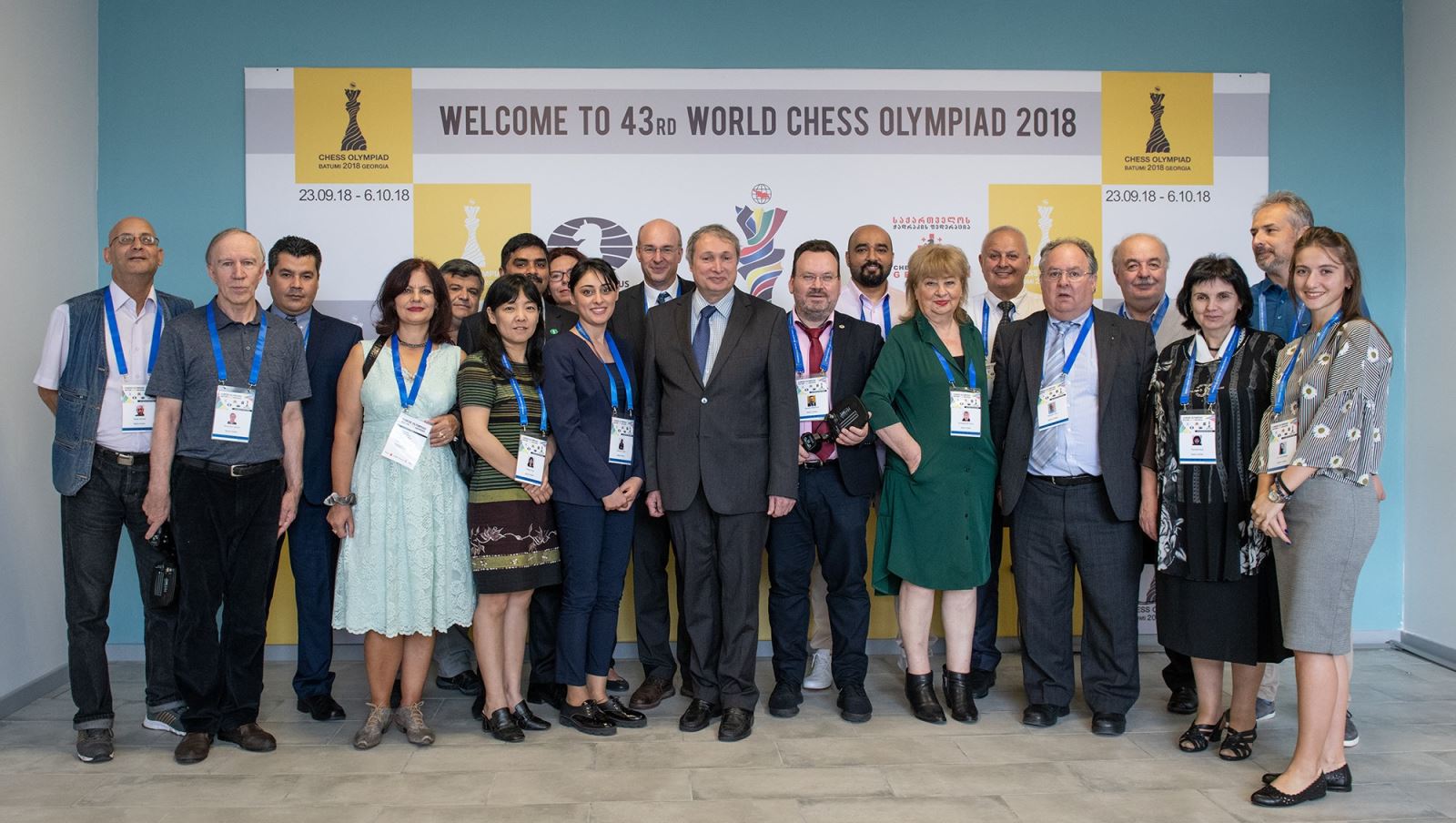
The arbiters that formed part of the Anti-Cheating team at the venue | Photo: David Llada
The closing ceremony took place at the Adjara Art Museuem and was attended by many people, some standing in the balconies and enjoying the spectacle! | Photo: Amruta Mokal
The Batumi World Chess Olympiad came to an end. It was 13 days filled with chess and a lot of excitement. | Photo: Amruta Mokal
.jpg)
We would like to thank GM Surya Sekhar Ganguly for providing high-class analysis throughout the Olympiad for the readers of ChessBase. Ganguly mentioned after the tournament:
"I often read reports on chess websites and I feel that the annotators make use of a lot of engines. My approach was different from this. I wanted to put myself in the shoes of the players and think for myself as to what I would do. The revelations while doing that are what form part of my analysis. I hope you enjoyed them and learnt from it."
We would like to mention that you can find more of Ganguly's analysis in the next issue of ChessBase Magazine.
| Advertising |